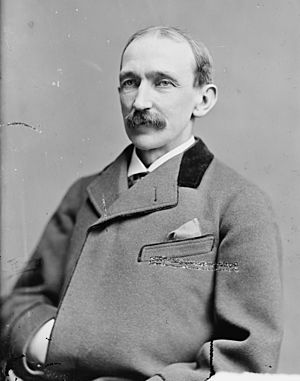Wayne MacVeagh facts for kids
Quick facts for kids
Wayne MacVeagh
|
|
|---|---|
 |
|
| United States Ambassador to Italy | |
| In office March 11, 1894 – March 4, 1897 |
|
| President | Grover Cleveland |
| Preceded by | William Potter |
| Succeeded by | William Draper |
| 36th United States Attorney General | |
| In office March 5, 1881 – December 15, 1881 |
|
| President | James A. Garfield Chester A. Arthur |
| Preceded by | Charles Devens |
| Succeeded by | Benjamin H. Brewster |
| United States Ambassador to the Ottoman Empire | |
| In office October 25, 1870 – June 10, 1871 |
|
| President | Ulysses S. Grant |
| Preceded by | Edward Morris |
| Succeeded by | George Boker |
| Personal details | |
| Born |
Isaac Wayne MacVeagh
April 19, 1833 Phoenixville, Pennsylvania, U.S. |
| Died | January 11, 1917 (aged 83) Washington, D.C., U.S. |
| Political party | Republican (Before 1892, 1896–1917) Democratic (1892–1896) |
| Spouses | Letitia Lewis Virginia Cameron |
| Relations | Franklin MacVeagh (Brother) |
| Children | Charles |
| Education | Yale University (BA) |
| Signature | |
| Military service | |
| Allegiance | |
| Branch/service | Militia Union Army |
| Years of service | 1862–1863 |
| Battles/wars | American Civil War |
Isaac Wayne MacVeagh (born April 19, 1833, died January 11, 1917) was an important American lawyer, politician, and diplomat. He held several key roles in the United States government. One of his most important jobs was serving as the 36th Attorney General of the United States. He worked under Presidents James A. Garfield and Chester A. Arthur.
Who Was Isaac Wayne MacVeagh?
Isaac Wayne MacVeagh was a well-known figure in American politics and law during the late 1800s and early 1900s. He was known for his intelligence and his dedication to public service. His career included working as a lawyer, serving in the military, and representing the United States in other countries.
Early Life and Education
Isaac Wayne MacVeagh was born in Phoenixville, Pennsylvania, on April 19, 1833. His parents were Major MacVeagh and Margaret Lincoln McVeagh. He had a brother named Franklin MacVeagh, who also became a famous person. Franklin later served as the U.S. Secretary of the Treasury.
Isaac went to Yale University, a well-known college. He studied hard and graduated in 1853. After college, he became a lawyer in 1856. From 1859 to 1864, he worked as the District Attorney for Chester County, Pennsylvania. This job meant he was the chief prosecutor for the county.
Service During the Civil War
During the American Civil War, MacVeagh helped protect Pennsylvania. He joined the state's emergency militia in 1862 and 1863. This militia was formed to defend against attacks from the Confederate army. He even started his own cavalry company and later became a major in the 29th Emergency Militia Regiment.
A Career in Public Service
MacVeagh was a strong member of the Republican Party. He held several important positions throughout his career.
Ambassador to the Ottoman Empire
From 1870 to 1871, MacVeagh served as the Ambassador to the Ottoman Empire. This meant he represented the United States in what is now modern-day Turkey. He helped manage relations between the two countries.
Helping Resolve Political Issues
In 1877, President Rutherford B. Hayes sent MacVeagh to Louisiana. This was part of the "MacVeagh Commission." Their job was to help settle a dispute between two different state governments. His work helped the U.S. troops leave the state, bringing peace to the area.
United States Attorney General
In 1881, MacVeagh became the 36th United States Attorney General. This is a very important job, as the Attorney General is the chief law enforcement officer and legal advisor to the President. He served under President James A. Garfield. After President Garfield's tragic assassination, MacVeagh resigned. However, he continued to serve as a cabinet member under the new President, Chester A. Arthur.
Ambassador to Italy
Later, in 1892, MacVeagh supported Grover Cleveland, who was running for president as a Democrat. From 1893 to 1897, MacVeagh served as the United States Ambassador to Italy. He represented the U.S. in Italy, working to strengthen ties between the two nations. After this, he returned to the Republican Party in 1896.
International Law Work
In 1903, MacVeagh played a key role in an important international case. He was the chief lawyer for the United States at the Hague tribunal. This court case involved claims from Germany, Britain, and Italy against Venezuela. His work helped resolve this international dispute.
Later Years and Views
During World War I, MacVeagh strongly supported the Allies. These were countries like Britain and France. He wrote articles expressing his views. In one article, "The Impossible Chasm," he wrote about the war in July 1915. In his last article, "Lusitania Day: May 7 1916," he criticized the American government for being slow to act against Germany.
Personal Life
Isaac Wayne MacVeagh married Letitia Miner Lewis in 1856. They had one son, Charles MacVeagh (born June 6, 1860, died December 4, 1931). Charles also became a diplomat and served as the United States Ambassador to Japan.
After his first wife passed away, MacVeagh married Virginia Rolette Cameron in 1866. Virginia was the daughter of U.S. Secretary of War Simon Cameron.
Isaac Wayne MacVeagh died in Washington, D.C., on January 11, 1917. He was buried in Bryn Mawr, Pennsylvania.
Images for kids
 | Valerie Thomas |
 | Frederick McKinley Jones |
 | George Edward Alcorn Jr. |
 | Thomas Mensah |

